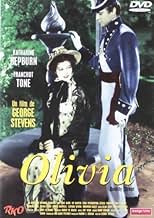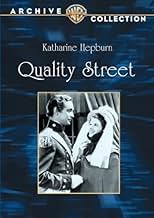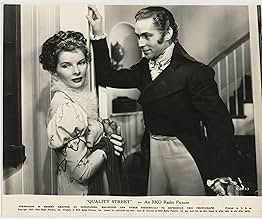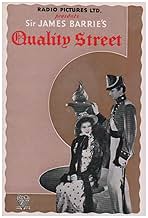VALUTAZIONE IMDb
6,2/10
1355
LA TUA VALUTAZIONE
Aggiungi una trama nella tua linguaIn the 1810s, an old maid poses as her own niece in order to teach her onetime beau a lesson.In the 1810s, an old maid poses as her own niece in order to teach her onetime beau a lesson.In the 1810s, an old maid poses as her own niece in order to teach her onetime beau a lesson.
- Regia
- Sceneggiatura
- Star
- Candidato a 1 Oscar
- 3 vittorie e 1 candidatura in totale
Sherwood Bailey
- William Smith
- (non citato nei titoli originali)
William Bakewell
- Lt. Spicer
- (non citato nei titoli originali)
Joan Fontaine
- Charlotte Parratt
- (non citato nei titoli originali)
Helena Grant
- Fanny Willoughby
- (non citato nei titoli originali)
Bonita Granville
- Isabella
- (non citato nei titoli originali)
Carmencita Johnson
- Student
- (non citato nei titoli originali)
Payne B. Johnson
- School Boy
- (non citato nei titoli originali)
Darwood Kaye
- Student
- (non citato nei titoli originali)
Florence Lake
- Henrietta Turnbull
- (non citato nei titoli originali)
Helen Lynn
- Girl
- (non citato nei titoli originali)
Lydia McKim
- Schoolgirl
- (non citato nei titoli originali)
Clifford Severn
- Arthur, a Student
- (non citato nei titoli originali)
Recensioni in evidenza
"Quality Street" from 1937 stars Katharine Hepburn, Franchot Tone, Fay Bainter, and Estelle Winwood. It's directed by George Stevens, who directed Hepburn later in Woman of the Year.
Hepburn plays Phoebe Throssel, a lovely young woman living with her spinster sister (Bainter) and surrounded by other spinsters who are neighbors in 1800. Phoebe is in love with one man, Valentine Brown -- as is pointed out in the film, other men have come calling, but Phoebe didn't want them.
Valentine, however, is off to the Napoleonic Wars. When he returns ten years later, Phoebe and her sister have opened a school in their home. Phoebe is embarrassed at being so exhausted and believes she has lost her looks. Nevertheless, Valentine wants her to attend the homecoming ball.
Phoebe, trying to prove something to herself, puts on a fancy dress and does her hair differently. When Valentine arrives, she introduces herself as Olivia ("Livvie"), Phoebe's niece. She gives him Phoebe's regrets, but she doesn't feel well. The two attend the ball together, where Livvy is surrounded by men. She believes that she now has a chance of Valentine proposing to Livvy. If only she can stay away from people who can expose her.
James Barrie wrote many plays that were performed by some of theater's biggest stars at the beginning of this century so it's no wonder Hollywood made it as a movie. It still retains many of its play-like qualities.
The character actors -- Bainter, Winwood, Eric Blore, are wonderful. Tone is very handsome though he doesn't have much to do. Though some might disagree, I felt Hepburn was somewhat miscast. Her portrayal of Phoebe/Livvie, though energetic, feels "put on" rather than organic. She was a tremendously strong actress but pulls back here - it doesn't seem natural.
The cast must have had a great deal of patience - Stevens, known as a very nice man, was known for having actors do 40 takes of one scene; it's one reason why Montgomery Clift never worked for him again after A Place in the Sun. He just didn't have the patience for it.
This is a charming, light film that looks stagy, but that shouldn't hurt your enjoyment of it.
Hepburn plays Phoebe Throssel, a lovely young woman living with her spinster sister (Bainter) and surrounded by other spinsters who are neighbors in 1800. Phoebe is in love with one man, Valentine Brown -- as is pointed out in the film, other men have come calling, but Phoebe didn't want them.
Valentine, however, is off to the Napoleonic Wars. When he returns ten years later, Phoebe and her sister have opened a school in their home. Phoebe is embarrassed at being so exhausted and believes she has lost her looks. Nevertheless, Valentine wants her to attend the homecoming ball.
Phoebe, trying to prove something to herself, puts on a fancy dress and does her hair differently. When Valentine arrives, she introduces herself as Olivia ("Livvie"), Phoebe's niece. She gives him Phoebe's regrets, but she doesn't feel well. The two attend the ball together, where Livvy is surrounded by men. She believes that she now has a chance of Valentine proposing to Livvy. If only she can stay away from people who can expose her.
James Barrie wrote many plays that were performed by some of theater's biggest stars at the beginning of this century so it's no wonder Hollywood made it as a movie. It still retains many of its play-like qualities.
The character actors -- Bainter, Winwood, Eric Blore, are wonderful. Tone is very handsome though he doesn't have much to do. Though some might disagree, I felt Hepburn was somewhat miscast. Her portrayal of Phoebe/Livvie, though energetic, feels "put on" rather than organic. She was a tremendously strong actress but pulls back here - it doesn't seem natural.
The cast must have had a great deal of patience - Stevens, known as a very nice man, was known for having actors do 40 takes of one scene; it's one reason why Montgomery Clift never worked for him again after A Place in the Sun. He just didn't have the patience for it.
This is a charming, light film that looks stagy, but that shouldn't hurt your enjoyment of it.
Quality Street is a contrived romance, with a small cast, on a set that looks like a play stage, with few visual impacts and in B&W. So, why did we enjoy it so much? The cast, down to the overplayed smaller parts, all does a great job. The ensemble cast brings spirit to even the small parts, the dialogue is clever, and the asides and glances make it fun. We particularly enjoyed the set and period behaviors as great insights on life in the early 19th century. Hollywood did a great job in establishing this period essence through effective use of hints and props. If you like Hepburn, you will enjoy this moral story, with feminine strength in an unforgiving society. Worth a relook!
The original play was set in the early 1800s during the time of the Napoleonic Wars. This is a very cute, funny comedy if you understand that it describes a time when a woman's future was defined by her looks, youth, fertility, and chastity. With the destruction of monastic life in England, the only future for a woman at the time of the play was marriage.
The witty cast and script made the film a lot of fun. Seem to recall reading that the Hollywood actresses of that era wanted to be in this movie, and I can see why - it was a hoot. Especially Eric Blore, who always turned in a good performance.
Western culture at the time of the play valued fertility in marriage highly, and men tended to want wives who were rounder than Miss Hepburn. Other than that, her performance was wonderful as always.
The witty cast and script made the film a lot of fun. Seem to recall reading that the Hollywood actresses of that era wanted to be in this movie, and I can see why - it was a hoot. Especially Eric Blore, who always turned in a good performance.
Western culture at the time of the play valued fertility in marriage highly, and men tended to want wives who were rounder than Miss Hepburn. Other than that, her performance was wonderful as always.
For her second time in a James M. Barrie role, Katharine Hepburn starred in a remake of Quality Street. Hepburn had previously played a little Scot's minx in The Little Minister also for RKO.
Barrie did right by her again, she was well cast as one of the Throssel sisters of Great Britain of the Napoleonic Era. She and sister Fay Bainter look like they're doomed to be spinsters. Bainter has resigned herself to that fate, but Hepburn still has hopes.
But when she thinks Franchot Tone might be popping the question, he's only around to tell her he's doing what Admiral Nelson expects of every man, his duty to England. In 1805 he enlists in the army and Hepburn and Bainter go on teaching school.
Ten years go by and when Tone doesn't at first recognize Hepburn when he returns, she thinks her prime has passed. But she'll teach Tone a lesson by impersonating her own made up niece. And what a niece, a naughty flirt who entrances all the young blades returned from the wars and doing a job on Tone's ego as well.
Quality Street has a quality history, it was first performed on Broadway by the immortal Maude Adams in 1901 and then made a silent film in 1927 starring Marion Davies and Conrad Nagel. I can certainly see why William Randolph Hearst thought this a good role for Davies. She could be both a crinolined heroine and also use her comic talents as well. Hepburn also gets to use her full talents playing one role straight and imitating a fictitious person at the same time.
Quality Street got an Oscar nomination for Best Musical Score. If it sounds familiar the theme was recycled later on for the frontier film Rachel And The Stranger. It was even given words that were sung on record by that film's star Robert Mitchum.
And George Stevens after doing Alice Adams with Hepburn was assigned this one as well. He'd do even better the third and last time he worked with Hepburn in Woman Of The Year.
Quality Street is a good film, but I'm sure that Depression Era audiences found a Victorian Era comedy a bit dated.
Barrie did right by her again, she was well cast as one of the Throssel sisters of Great Britain of the Napoleonic Era. She and sister Fay Bainter look like they're doomed to be spinsters. Bainter has resigned herself to that fate, but Hepburn still has hopes.
But when she thinks Franchot Tone might be popping the question, he's only around to tell her he's doing what Admiral Nelson expects of every man, his duty to England. In 1805 he enlists in the army and Hepburn and Bainter go on teaching school.
Ten years go by and when Tone doesn't at first recognize Hepburn when he returns, she thinks her prime has passed. But she'll teach Tone a lesson by impersonating her own made up niece. And what a niece, a naughty flirt who entrances all the young blades returned from the wars and doing a job on Tone's ego as well.
Quality Street has a quality history, it was first performed on Broadway by the immortal Maude Adams in 1901 and then made a silent film in 1927 starring Marion Davies and Conrad Nagel. I can certainly see why William Randolph Hearst thought this a good role for Davies. She could be both a crinolined heroine and also use her comic talents as well. Hepburn also gets to use her full talents playing one role straight and imitating a fictitious person at the same time.
Quality Street got an Oscar nomination for Best Musical Score. If it sounds familiar the theme was recycled later on for the frontier film Rachel And The Stranger. It was even given words that were sung on record by that film's star Robert Mitchum.
And George Stevens after doing Alice Adams with Hepburn was assigned this one as well. He'd do even better the third and last time he worked with Hepburn in Woman Of The Year.
Quality Street is a good film, but I'm sure that Depression Era audiences found a Victorian Era comedy a bit dated.
Delightful comedy of errors. Pheobe (Hepburn) is in love with the dashing Dr. Brown, but alas her love is unrequited. They meet again 10 years later on his return from the Napoleonic Wars. She has wilted under the strain of teaching little children and is self-conscious about her age. On a whim she decides to dress in her former radiant style, and ends up being mistaken by Dr. Brown for Pheobe's niece. They start to court, and from there it's all silly and predictable, but... sparkling dialogue, great acting and wonderful supporting parts (especially the nosy old spinsters at the windows)
Lo sapevi?
- QuizThe Nestle produced chocolates "Quality Street" were named after J. M Barrie's play by their original manufacturer Mackintosh in 1936.
- BlooperWhen Phoebe and Susan are talking about Mr. B., Phoebe is on a chair and Susan is sitting on a sofa a certain distance near a bonnet. But on the following cuts, Susan's sitting position keeps changing so that she is gets closer and closer to the bonnet.
- Citazioni
Mary Willoughby: [Goes to the window and looks out] It's that impertinent recruiting sergeant. I passed him on the street yesterday. He closed one of his eyes at me, then quickly opened it again.
[She demonstrates to the other ladies in the room]
Mary Willoughby: I knew what he meant.
[She looks out again and sees the recruiting officer wink at her. She quickly closes the window curtain]
- Curiosità sui creditiOpening card:
1805 England Quality Street Where a gentleman passerby is an event.
- ConnessioniFeatured in George Stevens: A Filmmaker's Journey (1984)
I più visti
Accedi per valutare e creare un elenco di titoli salvati per ottenere consigli personalizzati
- How long is Quality Street?Powered by Alexa
Dettagli
- Tempo di esecuzione
- 1h 23min(83 min)
- Colore
- Proporzioni
- 1.37 : 1
Contribuisci a questa pagina
Suggerisci una modifica o aggiungi i contenuti mancanti





















